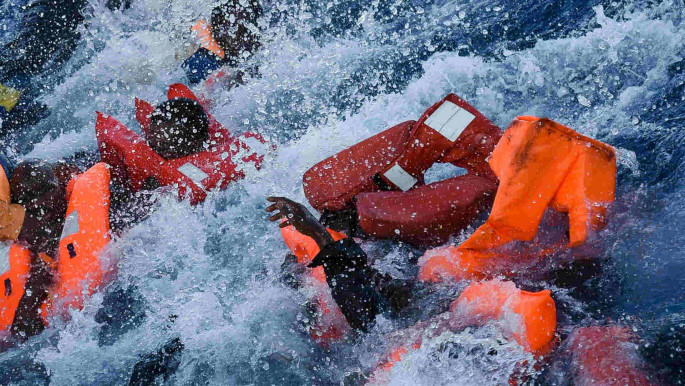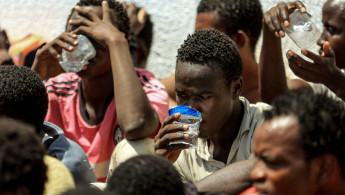Migrants face even more danger after disputed Italy-Libya deal
African and European leaders meeting in Paris this month agreed to stem migration to Europe, offering to support Libyan coastguards and help Chad and Niger – all three transit countries for migrants - with stronger border control, as a way to shut down the Mediterranean route for migration into Europe, and retaining as many people in Africa as possible.
Overwhelmed by people arriving on boats from Libya, and left with little help from fellow EU states, once-welcoming Italy has now adjusted to the European migration policy of strict borders and walls.
Some 125,000 people, mostly sub-Saharan Africans, have crossed the Mediterranean by boat so far this year, the UN reports. But an estimated 2,400 have died on the way.
The vast majority of arrivals have landed in Italy, just 300km from Libyan shores, before travelling on to other EU nations.
 |
Libyans don't welcome this mission, it violates our coasts and borders. Dispatching warships in Libyan waters doesn't stop migrants crossing the sea or fight traffickers |  |
Last month, the Italian parliament voted to send its navy to support the Libyan coastguard in intercepting migrants and targeting human traffickers.
The operation, requested by Libya's UN-backed Government of National Accord (GNA) in Tripoli, found opposition from rival authorities in Tobruk. General Khalifa Haftar, who controls most of eastern Libya, ordered his forces to confront any vessels engaged in the naval support mission.
The Italian move was met with widespread resistance in the North African country where the presence of foreign military ships has been seen as a violation of national sovereignty. As former colonial power, any perceived Italian interference in Libya is highly sensitive.
Read more: Europe's border regime leaves the Mediterranean a (profitable) graveyard
"Libyans don't welcome this mission, it violates our coasts and borders. Dispatching warships in Libyan waters doesn't stop migrants crossing the sea or fight traffickers," said Hamed Rafeh Alhiali, mayor of Sabha municipality.
The capital of Libya's southern Fezzan region, Sabha is a gateway to Libya for people coming from neighbouring African countries, and the first town migrants see after emerging from the desert. It is a frequent stopping point for people who often find themselves exploited by traffickers; forced into hard labour, abducted, abused and sold from one smuggling group to another.
 |
Coupled with the general state of lawlessness, the poor economy and high level of violence make 'prime conditions for people's right of the strongest' |  |
Libya has been a springboard for clandestine migration to Europe since its descent into chaos after the 2011 revolution ousted its long-standing ruler Muammar Gaddafi. Fractured between two rival camps, each with its political factions and armed militias fighting for power, Libya is today a lawless place with weak state and security institutions.
Coupled with the general state of lawlessness, the poor economy and high level of violence make "prime conditions for people's right of the strongest", Kraay stated. Given the country's long history of labour migration, the illegal trafficking of people has become a profitable business in Libya, perhaps the only functioning economic activity.
"Destabilisation of Libya, where power is completely devolved to an array of armed groups, has created a fertile ground for human smuggling to flourish," noted Mark Micallef, a senior research fellow at the Global Initiative Against Transnational Organized Crime. This applies to all kinds of smuggling - fuel, drugs, weapons and currency - a huge, illegal economy that fuels the country's further fragmentation.
Well before heading to Europe, migrants face major risks while crossing through Libya in search for any work opportunity or life prospect.
Marcella Kraay, project coordinator at Médecins Sans Frontières, has met a number of people aboard the Aquarius rescue boat in the past few months. She talked about some of their experiences in travelling through Libya.
 The Mediterranean has become a watery grave for The Mediterranean has become a watery grave for thousands of refugees in recent years [Getty] |
Some left their home countries fleeing war and violence, others were escaping persecution and poverty as they had nothing to live on and sustain their families back home, many of them originally came to Libya as labour migrants and never intended to go to Europe.
One 18-year old boy from Ivory Coast was pushed to travel from one country to the next to find work and support his family - until he reached Libya and fell into the hands of human traffickers.
Once in Libya, it is not uncommon that migrants become trapped in the smuggling and human trafficking network, and find themselves working without pay and unable to leave, losing control of their lives along the way.
An Eritrean man, aged 26, ran away to skip military conscription and to continue his studies. He recounted the dreadful crossing of the desert in Sudan with people dying on the way.
A lot of Bangladeshis were promised jobs in Libya, later kidnapped and forced into unpaid labour for months and months. They were pushed to get on overcrowded, unsafe boats and brave the Mediterranean. More than one told Kraay out of desperation: "I'd rather die at sea than live in Libya."
Read more: Europe's fortress condemns refugees to Libyan danger
"As medics, we have often examined people carrying clear traces of maltreatment, wounds of torture, their bodies show that they have been kept captive in very unsanitary conditions, under-fed if not malnourished," the MSF worker told The New Arab.
Migrants and refugees suffer violence of all types, illegal imprisonments, sexual abuse and torture and the hands of the local militias, human traffickers and armed gangs who control most of Libya's territory, according to a new report published by Oxfam, Borderline Sicilia and MEDU (Medici per i Diritti Umani).
"From testimonies collected, we observed that 90 percent of the interviewed people who travelled via Libya were subjected to inhuman treatment such as arbitrary detention, violence and torture," reported Adelaide Massimi, who coordinates MEDU's mobile clinic providing assistance to newly arrived migrants in Rome.
Some 10 percent of new arrivals were unaccompanied children who had either been subjected to beatings or witnessed violence during their detention in Libya.
MEDU found that 80 percent had suffered water and food deprivation, and 70 percent had been imprisoned in official or unofficial detention facilities - in most cases overcrowded and with no access to sanitation. Some migrant detention centres are run by official authorities, others are operated by armed militants or criminal groups with the aim of collecting migrants to be sold.
Abuses perpetrated inside these detentions centres have been well-documented in previous reports revealing practices of systematic violence amounting to the worst atrocities.
In the face of the hell that Libya has become, Italy's plan to block and return migrants to the Libyan mainland is of serious concern to humanitarians - as is the European idea of enforcing control over migratory flows.
Read more: Blaming the rescuers - EU policy lets refugees drown
The effect of returning people to the very country they are fleeing is very much imaginable.
"The fact that migrants are intercepted at sea and brought back where they re-enter the cycle of extortion, abuse and violence is to me 'out of sight, out of mind'," Kraay stressed.
She defined the EU's strategy as "a 100 percent policy of deterrence", which offered no long-term solution.
"We find it really unacceptable that people have no other option but to undertake dangerous journeys risking their lives, with many drowning on the doorstep of Europe," said the MSF coordinator.
A unity deal for Libya remains a pre-requisite to any efficient managing of the migrant and refugee crisis and people trafficking.
"I am baffled that we still don't have a coherent European strategy for Libya," Micallef said. "I find the separate initiatives pushed in by Italy and France problematic. None of those is conducive to stabilisation in Libya, it is rather high-risk."
Since power in Libya is being fought over by so many different armed factions, a coherent long-term strategy should not play into this deterioration by pouring money into a broken system. Instead, Micallef argued, the system should be dismantled and rebuilt anew.
Libya's stabilisation, he continued, would benefit Italy and Europe in helping to reduce the migrant flow. Reducing and managing migratory flows in a more effective, systematic way so to divert the flows away from smuggling networks would likewise help to enhance and preserve Libya's stability.
The mayor of Sabha suggested that the EU and international community should support Libyan municipalities, particularly those in coastal and border areas.
"If we do not ensure stability and security in Libya, there is going to be a huge backlash not just for us but Europe too," Alhiali added. "Libya is bordered by six countries, it has a considerable amount of wealth and weapons, and the IS threat is still around."
The EU persists in efforts to keep refugees and migrants away from its shores, at a very high human cost. With military vessels on the Mediterranean and no regular, safe or legal mechanisms of access to Europe, people escaping conflict, violence and hunger will be made more desperate, pushed to take more perilous travel routes.
Alessandra Bajec is a freelance journalist currently based in Beirut. Follow her on Twitter: @AlessandraBajec


![President Pezeshkian has denounced Israel's attacks on Lebanon [Getty]](/sites/default/files/styles/image_684x385/public/2173482924.jpeg?h=a5f2f23a&itok=q3evVtko)



 Follow the Middle East's top stories in English at The New Arab on Google News
Follow the Middle East's top stories in English at The New Arab on Google News


